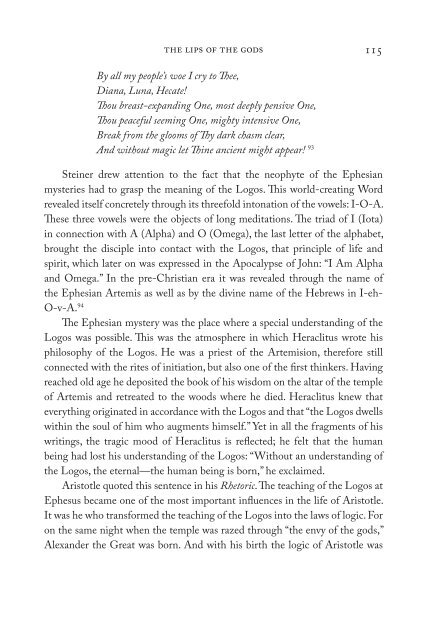The Gospel of Hellas - Research Institute for Waldorf Education
The Gospel of Hellas - Research Institute for Waldorf Education
The Gospel of Hellas - Research Institute for Waldorf Education
You also want an ePaper? Increase the reach of your titles
YUMPU automatically turns print PDFs into web optimized ePapers that Google loves.
the lips <strong>of</strong> the gods<br />
By all my people’s woe I cry to <strong>The</strong>e,<br />
Diana, Luna, Hecate!<br />
Thou breast-expanding One, most deeply pensive One,<br />
Thou peaceful seeming One, mighty intensive One,<br />
Break from the glooms <strong>of</strong> Thy dark chasm clear,<br />
And without magic let Thine ancient might appear! 93<br />
Steiner drew attention to the fact that the neophyte <strong>of</strong> the Ephesian<br />
mysteries had to grasp the meaning <strong>of</strong> the Logos. This world-creating Word<br />
revealed itself concretely through its threefold intonation <strong>of</strong> the vowels: I-O-A.<br />
<strong>The</strong>se three vowels were the objects <strong>of</strong> long meditations. <strong>The</strong> triad <strong>of</strong> I (Iota)<br />
in connection with A (Alpha) and O (Omega), the last letter <strong>of</strong> the alphabet,<br />
brought the disciple into contact with the Logos, that principle <strong>of</strong> life and<br />
spirit, which later on was expressed in the Apocalypse <strong>of</strong> John: “I Am Alpha<br />
and Omega.” In the pre-Christian era it was revealed through the name <strong>of</strong><br />
the Ephesian Artemis as well as by the divine name <strong>of</strong> the Hebrews in I-eh-<br />
O-v-A. 94<br />
<strong>The</strong> Ephesian mystery was the place where a special understanding <strong>of</strong> the<br />
Logos was possible. This was the atmosphere in which Heraclitus wrote his<br />
philosophy <strong>of</strong> the Logos. He was a priest <strong>of</strong> the Artemision, there<strong>for</strong>e still<br />
connected with the rites <strong>of</strong> initiation, but also one <strong>of</strong> the first thinkers. Having<br />
reached old age he deposited the book <strong>of</strong> his wisdom on the altar <strong>of</strong> the temple<br />
<strong>of</strong> Artemis and retreated to the woods where he died. Heraclitus knew that<br />
everything originated in accordance with the Logos and that “the Logos dwells<br />
within the soul <strong>of</strong> him who augments himself.” Yet in all the fragments <strong>of</strong> his<br />
writings, the tragic mood <strong>of</strong> Heraclitus is reflected; he felt that the human<br />
being had lost his understanding <strong>of</strong> the Logos: “Without an understanding <strong>of</strong><br />
the Logos, the eternal—the human being is born,” he exclaimed.<br />
Aristotle quoted this sentence in his Rhetoric. <strong>The</strong> teaching <strong>of</strong> the Logos at<br />
Ephesus became one <strong>of</strong> the most important influences in the life <strong>of</strong> Aristotle.<br />
It was he who trans<strong>for</strong>med the teaching <strong>of</strong> the Logos into the laws <strong>of</strong> logic. For<br />
on the same night when the temple was razed through “the envy <strong>of</strong> the gods,”<br />
Alexander the Great was born. And with his birth the logic <strong>of</strong> Aristotle was

















